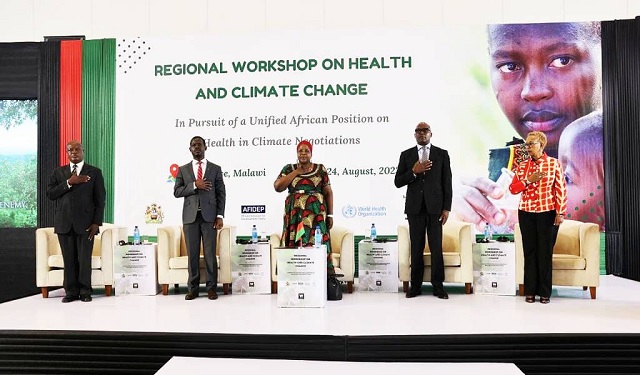
The speakers called for engaging communities, ensuring adaptation and facilitating transparent communication as critical strategies for success toward a healthier and resilient future
Lilongwe, Malawi | KIRAN PANDY | Various stakeholders from Africa gathered in Malawi to deliberate on integrating health into the climate agenda ahead of the 28th Conference of Parties (COP28) to the United Nations Framework Convention on Climate Change (UNFCC) to be held in Dubai later this year.
On August 22, 2023, the African Group of Negotiators (AGN), ministers and various climate change and health stakeholders from the continent came together to develop a unified African position on health in the UNFCCC negotiations.
The need for integrating health and climate change considerations into policies and systems took centre stage on the inaugural day. The three-day Regional Workshop on Climate Change and Health will also contribute to the Africa Climate Summit to be held in Kenya in early September 2023.
The discussions centred mainly around the link between climate change and health, particularly in Africa. The speakers explored how these factors intersect and impact one another, underlining the need for coordinated action.
The speakers called for engaging communities, ensuring adaptation and facilitating transparent communication as critical strategies for success toward a healthier and resilient future.
Dr Githanji Gitahi, CEO of nonprofit AMREF Health Africa and one of the co-hosts of the event, underscored the need for a paradigm shift in addressing climate justice and called for integrating health into climate justice dialogue.
While Ephraim Mwepya Shitima, chairperson of AGN, called for charting a course that enhances resilience and sustainable development, Malawi’s health minister, Khumbize Kandodo Chiponda, called for escalated funding to safeguard both the health and the future of communities in the African continent.
Moreover, the speakers called for optimising domestic resources and effective allocation to address the vulnerabilities.
“Africa has come together to advocate for a common position that transcends boundaries, resonates through diverse sectors and rallies for escalated funding. This funding is the lifeline needed to safeguard both the health and the future of our communities,” Chiponda said in her resounding call to action.
Dr Mithika Mwenda, executive director of the Pan African Climate Justice Alliance, echoed the views of the Malawian health minister and flagged the gaps in funding for health.
In the global multilateral funding systems, just 0.5 per cent of funding is allocated to the health sector. In addition to this, less than half of the required needs for water, sanitation and hygiene financing are met, he stated.
So, there is a need to advocate for more significant funding to bridge these gaps, especially given mitigation, adaptation, loss and damage, especially within the African context, he reminded.
With just 100 days left for COP28, the Africa regional meeting is vital since tens of millions of Africans have been bearing the wrath of climate change in the form of heat stress, extreme weather and increased transmission of infectious diseases, alerted the IPCC in its sixth assessment.
Around 1,839 climate-related disasters in the continent from 1970-2021 claimed at least 733,585 human lives and caused $43bn in economic losses, according to the World Meteorological Organization.
Though countries in the region are highly vulnerable to the negative impacts of climate change and associated health impacts, they are the least prepared to address these crises, according to the World Health Organization.
The health sector, significantly affected by climate change, will undoubtedly have far-reaching impacts in amplifying existing health inequalities. This will significantly affect the progress of the 2030 Sustainable Development Goals and the 2063 Africa Agenda as well.
The regional meet is, therefore, timely and is expected to help shape policy decisions, drive advocacy efforts and guide collaborative actions.
*****
Source: downtoearth.org
 The Independent Uganda: You get the Truth we Pay the Price
The Independent Uganda: You get the Truth we Pay the Price



